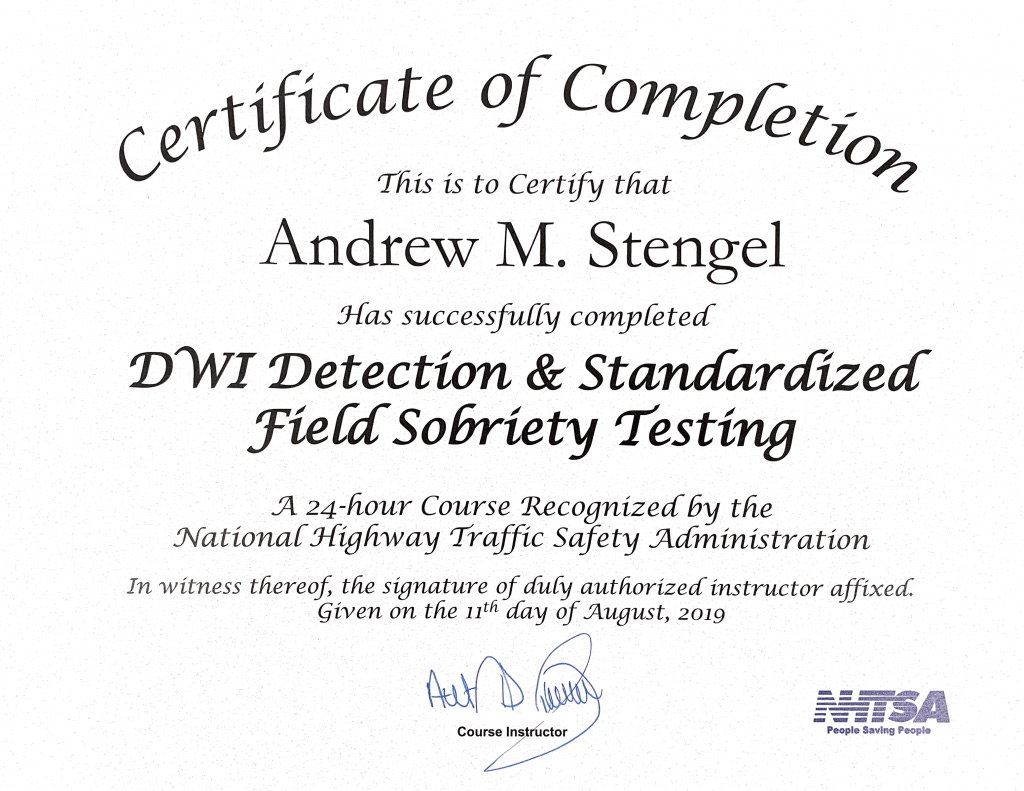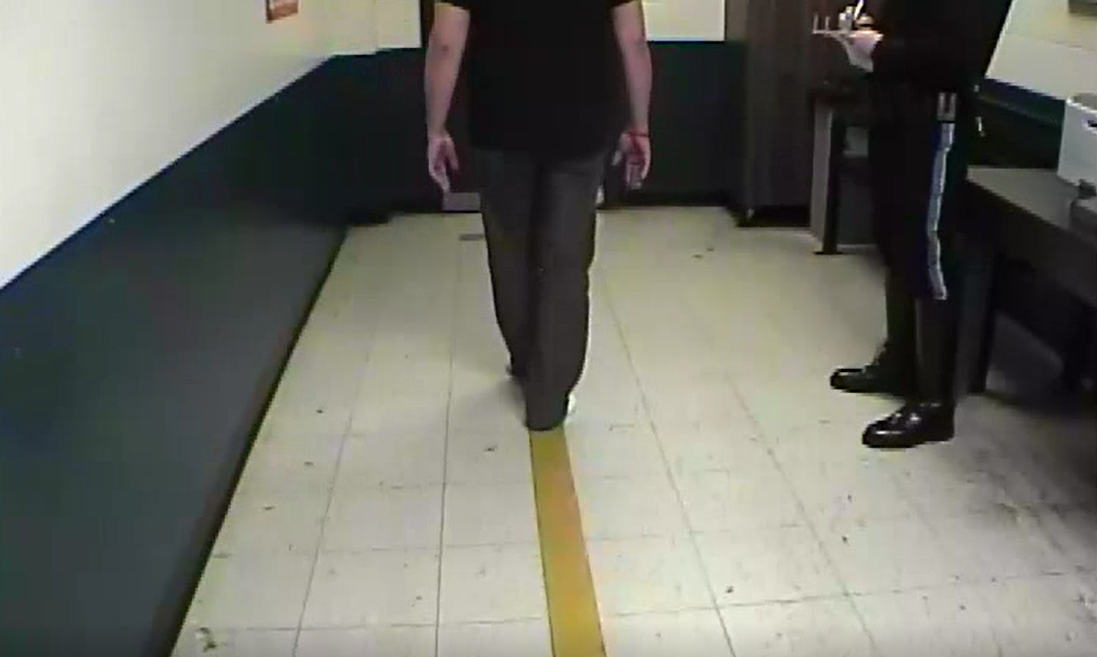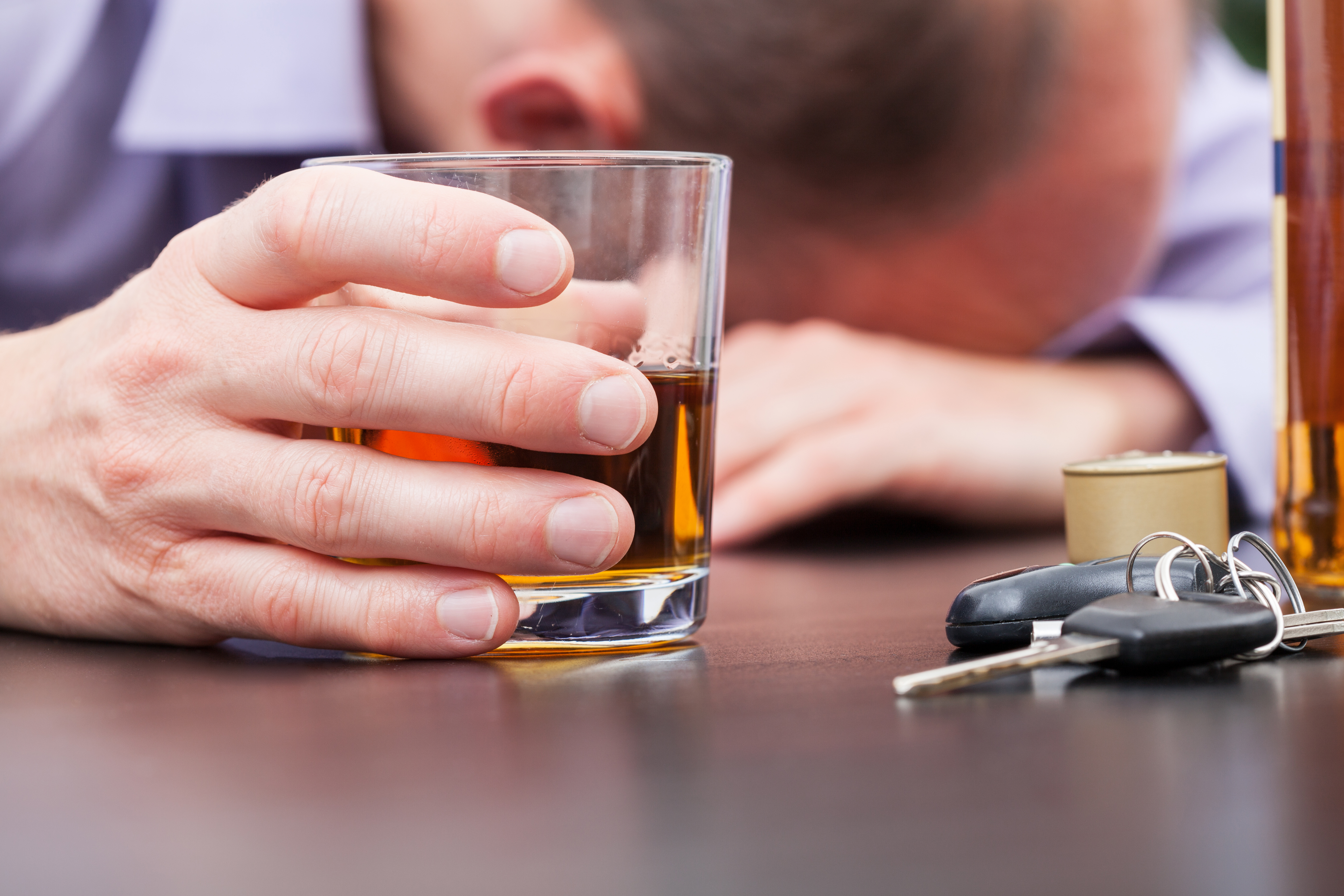DWI Field Sobriety Tests in New York
When a person is stopped by the police for suspicion of Driving While Intoxicated or DWI in NYC, or Driving While Ability Impaired by Drugs (DWAI by Drugs) he or she will nearly always be asked to submit to both a chemical test and field sobriety tests. The DWI chemical test is most often a breathalyzer which may be a portable device and a larger instrument located at police precinct.

Andrew M. Stengel is trained the same way as police to perform DWI Standardized Field Sobriety Tests.
In New York City, DWI field sobriety tests are performed at a police precinct. Outside of New York City, field sobriety tests are usually performed at the site of the DWI stop on the roadside. While chemical tests are based on scientific measurements (that can often be refuted by an experienced DWI defense attorney), field sobriety tests are not scientific. They are mostly physical tests that are performed to determine intoxication and the results are completely subjective. In fact, the results of field sobriety tests do not always correlate to intoxication and may be invalidated by an experienced DWI defense attorney.
Refusing to submit to a DWI chemical test has several legal consequences. First, a person’s license or privilege to drive in New York will be revoked for 1 year (in addition to a $500 civil penalty and a driver’s assessment of $250 annually for 3 years). Next, a prosecutor may not offer a plea bargain to the non-criminal charge of Driving While Ability Impaired (DWAI) if certain general conditions are met (a low blood alcohol content–or BAC–reading, no property damage, no physical injury and no prior criminal convictions). Finally, the refusal may be used as evidence at trial that a person refused a chemical test because he or she knew that they were intoxicated, which is known as consciousness of guilt.
However, the refusal to submit to DWI field sobriety tests does not have all of the legal consequences as a chemical test refusal whether a breathalyzer or otherwise. The most direct effect on refusing field sobriety tests concerns evidence of intoxication.
If a person does not preform the sobriety tests, but would have done well, then the positive results will not assist the defense. However, if a person refuses the sobriety tests and would have done poorly, the negative results will not assist the prosecution. Obviously, a person will not know the outcome before taking the field sobriety tests. Whether or not to agree to DWI field sobriety tests is a fact specific question about the volume and type of alcohol consumed, the time over which alcohol was consumed, a person’s weight and the tolerance for intoxication. Blanket advice is unwise because every case is different.
Types of DWI Sobriety Tests Administered in New York
Sobriety tests falls under two categories. First, non-standardized tests, which are usually administered by the New York City Police Department (NYPD) and are often called DWI coordination tests. Second, standardized field sobriety tests (SFSTs), which are usually administered by police outside of New York City like New York State Troopers were developed by the National Highway Traffic Safety Administration (NHTSA). The NYPD and police outside of New York City might administer a combination of the non-standardized and standardized DWI field sobriety tests. In addition, there is overlap between the non-standardized and standardized tests.
The non-standardized DWI field sobriety tests given by the NYPD, consist of three separate tests: walk and turn, one-leg stand and finger to nose. Standardized field sobriety DWI tests also include three tests: horizontal gaze nystagmus, walk and turn and one-leg stand. Two other non-standardized tests that are given outside of New York City include a balance test (also known as the Romberg test) and the alphabet test.
The NYPD’s DWI Coordination Tests
 When stopped for DWI in New York City, the person will be brought to one of only a few precincts that has a breathalyzer instrument. Each of these precincts has a small room where the breathalyzer is located and where the DWI coordination tests are performed. Once a person is inside of the room, the entire encounter is recorded on video, which is eventually turned over to the defense. The resulting video, which is likely admissible at trial can either help or hurt a person’s defense to a DWI charge.
When stopped for DWI in New York City, the person will be brought to one of only a few precincts that has a breathalyzer instrument. Each of these precincts has a small room where the breathalyzer is located and where the DWI coordination tests are performed. Once a person is inside of the room, the entire encounter is recorded on video, which is eventually turned over to the defense. The resulting video, which is likely admissible at trial can either help or hurt a person’s defense to a DWI charge.
Once a person is asked to submit to a chemical test or breathalyzer by the NYPD, whether they submit or refuse, next he or she will be asked to take a coordination test.
Typically a police officer with the NYPD will say:
I would like you to submit to a simple test for physical coordination. The video camera will record the test. Will you take the test?
If the answer is yes, then the coordination test will be given. If the answer is no, then it will obviously not be given. Police will read the above statement and a second time and repeat the request if the answer is unclear.
If a person agrees, the NYPD officer will read specific instructions and demonstrate each of the three DWI coordination tests before a person is asked to perform each. The police officer observing the test will grade a person’s performance on required DWI paperwork.
Unlike a chemical test, which is based on science and yields a numerical outcome indicating blood alcohol content (although the results are not always accurate and may be discredited), the results of standardized and non-standardized field sobriety tests are highly subjective. Poor results of a sobriety test are thus subject to attack by an attorney is experienced DWI defense attorney.






This site is absolutely fabulous!